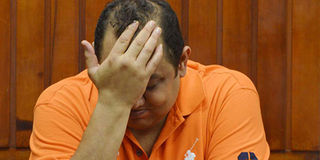Premium
Akasha family's drug empire turned upside down

Baktash Akasha, and his co-accused (not in frame), at Mombasa Law Courts during the hearing of their extradition case on December 1, 2016. They were charged with drug dealing. PHOTO | FILE | NATION MEDIA GROUP
What you need to know:
- Four high-end vehicles were left to rot at the police headquarters when Baktash Akasha and Ibrahim Akasha were first arrested in connection to drugs in 2014.
- Perhaps the same fate awaits Swaleh Yusuf Ahmed, alias Kandereni, who has been among top drug dealers that are seen to fill the vacuum left by the Akashas.
An abandoned house locked with a huge padlock is what has become of an immaculately built residence that is enclosed by a lengthy perimeter wall topped with electric lines along Beach Road in Nyali.
This is one of the Akasha family’s posh residences in Mombasa. A peep through the main gate of the residence tells of a fallen empire that once ruled without limits.
Here, during their heyday, one could barely spend less than 10 minutes before more than five top-of-the-range vehicles entered or exited from the compound of the luxurious house with 24-hour CCTV surveillance.
In just five years, the world has turned upside down for the once dreaded family that operated with impunity, especially at the Coast.
Now, their drug empire is splintered and controlled by ‘midgets’ – as they are known in the criminal underworld – with almost everyone being their own boss and making a killing out of it, even as security operatives go hard on them.
At their peak, bribery, as opposed to mafia-style killing and extortion associated with drug barons elsewhere in the world, was the modus operandi of the Akashas’ well-oiled family empire.
CARS IMPOUNDED
Money purchased loyalty, coerced and intimidated rivals, and subdued any threats to their business.
“The Akasha family long controlled drugs along Mombasa to Europe,” WikiLeaks Cable dated January 9, 2006 said of the organisation.
The flashy high-end vehicles that the members once rolled in on the streets of Mombasa and Nairobi have now found a new home – the Coast regional police headquarters, with some held in Nairobi.
Four high-end vehicles were left to rot at the police headquarters when Baktash Akasha and Ibrahim Akasha were first arrested in connection to drugs in 2014.
Baktash and his brother Ibrahim were extradited and pleaded guilty to six counts of trafficking and corruption charges in New York.
On Friday, Coast DCI boss Washington Muthee said officers from the Assets Recovery Agency are still following up on the cars.
“We are waiting for the agency to conclude their part before we claim ownership as the state. I can only confirm that the vehicles are here with us,” Mr Muthee said.
WARMTH LOST
Also seized by officers from the anti-narcotics unit that year were jewellery worth millions of shillings, which the family is also set to lose.
Back to their home in Nyali, the quiet and privacy that welcomed you inside the lavish residence has become a thing of the past.
Being staunch Muslims, the home has a mosque that was built by their late father, Ibrahim Akasha senior. This is where the family seeks solace whenever “aggrieved”.
“None of the family members live here, they left the house some time back,” a neighbour told the Saturday Nation.
The house is one of three that the family possesses in the Nyali suburb where such properties go for between Sh35 million and Sh100 million.
The vehicles being held by the police are among others that were impounded in Nairobi. Baktash also owns other posh houses in Nairobi’s Westlands.
The lives of members of the once revered prominent family that was defined by impunity have drastically changed.
ABANDONED
Relatives, friends and close allies of the family have also deserted them.
In a previous exclusive interview with the Saturday Nation, Mrs Fatma Akasha, the widow of the slain tycoon and mother of Baktash and Ibrahim, said people they once called “close allies” had abandoned them.
Perhaps the same fate awaits Swaleh Yusuf Ahmed, alias Kandereni, who has been among top drug dealers that are seen to fill the vacuum left by the Akashas.
Ahmed was first convicted for 15 years in 1996 for trafficking in heroin and was sent to Shimo La Tewa Prison in Mombasa, from where he was released in January 1999 in unclear circumstances.
PROSECUTION
He was then rearrested in October 2001 when it was revealed that a cartel of court and prisons officials had forged documents to show that the Court of Appeal had allowed his release on bond pending the determination of his appeal.
In 2010, Ahmed was jailed for 25 years for trafficking five kilogrammes of heroin. However, he successfully appealed the sentence at a Mombasa court and was acquitted for lack of evidence.
In 2011 and 2013, he was also charged at the Mombasa Law Courts with trafficking drugs, but he won the cases.
A recent case involves seizure of cocaine worth Sh300 million that was recovered in Kikambala, Kilifi County. He is currently out on bond.




